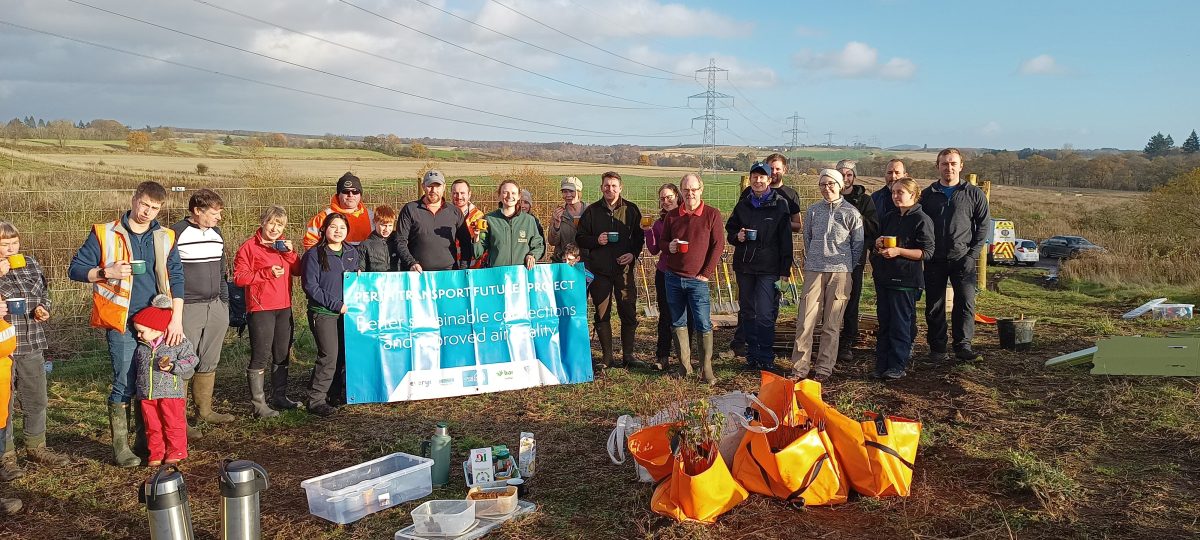Compensatory Planting
The renewed national effort to plant more trees and increase the overall woodland canopy has been notable in recent years as government, public and private sectors come together to tackle carbon targets. As well as addressing environmental needs, academic studies have shown the important role trees play in absorbing pollutants and bolstering social and health benefits.
Conversely, areas of forests or woodlands that are impacted by new developments will inevitably suffer from loss of biodiversity; consequently, there is a need to compensate for this.
Jillian Ferguson, Project Manager from Perth & Kinross Council commented, “As we look towards the future, and developing the space in which we live and work, there is an opportunity to make positive and long-lasting change. Not only will we address the immediate issues surrounding climate change, but we can also influence the biodiversity of our environment and provide health and wellbeing for generations.”
Whilst development of the Cross Tay Link Road project has resulted in the loss of 12.7 hectares of woodland, it is proposed to provide compensatory planting of 13.53 hectares.
In addition, BAM Nuttall and Perth & Kinross Council will plant more than 100,000 trees and shrubs across the project. By compensating for woodland lost, the project will generate a net-positive effect on the biodiversity of the area, as well as bringing additional social benefits including the restoration of lost habitats.
THE STATS
- Woodland lost – 12.7ha
- Compensatory planting – 13.53ha
As well as contracting GB Landscapes to supply and plant the trees, BAM Nuttall is also working with local community groups and schools to develop new habitats and improve biodiversity. These projects have been agreed with the Planning Authority and NatureScot.
Denmarkfield - December 2022 and January 2023

A new community woodland just north of Perth is being created as part of ‘Rewilding Denmarkfield’ with the first ground broken in December 2022 by a 27-strong group of BAM Nuttall employees, the Friends of Denmarkfield community group, and the Denmarkfield Rewilding Project staff.
The trees have been sourced through Scottish suppliers and are indigenous to the region, ensuring that, once established, they will be sympathetic to vegetation locally. Species include a mixture of oak, birch, rowan, hazel, aspen, holly, wild cherry, crab apple, dog rose, blackthorn and hawthorn.
The volunteers planted more than 600 trees and this was bolstered in January 2023 when the children from Luncarty Primary School enjoyed a day of outdoor learning and planting with Ellie Corsie and Izzy Jones from Rewilding Denmarkfield.
A total of 60 pupils, 5 parents, 2 teachers and CTLR project staff joined in thanks to Docherty’s Midland Coaches who kindly provided a bus to transport the schoolchildren to and from the site.
Deborah Swan, a teacher at Luncarty Primary School, said: “The children who have not been down to Denmarkfield before, owing to it being too far, have loved the opportunity to be out on a school trip and lots of our younger children have loved being on the bus! Thank you so much for enabling us to use the bus and to provide an opportunity for all our classes!”
BAM Nuttall’s landscaping contractor GB Landscapes will plant a further 4,200 trees across the Denmarkfield rewilding project site prior to the end of 2023.
Ellie Corsie, Rewilding Denmarkfield Project Manager, commented, “We are very grateful to the Cross Tay Link Road project for supporting our rewilding project. With the trees and fencing they have provided we are able to implement our ambitious and unique woodland creation project which will benefit biodiversity and the climate.”
Pitcairngreen - January 2022
The site at Pitcairngreen had been identified in advance of the project and as well as supplying and planting trees, GB Landscapes also carried out work to prepare the ground, supply and fit tree protectors, and provide and install deer fencing. Over the course of the three days they planted 4,820 trees with a squad of eight operatives. Oak trees represent half of the trees planted, other species planted include birch, hazel, rowan, cherry and holly. Maintenance of the trees will also be undertaken until those planted are established.

